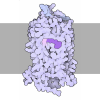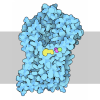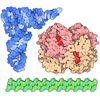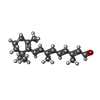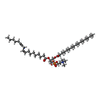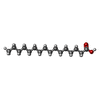[English] 日本語
 Yorodumi
Yorodumi- PDB-8iu0: Cryo-EM structure of the potassium-selective channelrhodopsin HcK... -
+ Open data
Open data
- Basic information
Basic information
| Entry | Database: PDB / ID: 8iu0 | ||||||||||||||||||||||||
|---|---|---|---|---|---|---|---|---|---|---|---|---|---|---|---|---|---|---|---|---|---|---|---|---|---|
| Title | Cryo-EM structure of the potassium-selective channelrhodopsin HcKCR1 H225F mutant in lipid nanodisc | ||||||||||||||||||||||||
 Components Components | HcKCR1 | ||||||||||||||||||||||||
 Keywords Keywords | MEMBRANE PROTEIN / Cryo-EM | ||||||||||||||||||||||||
| Function / homology | Rhopdopsin 7-helix transmembrane proteins / Rhodopsin 7-helix transmembrane proteins / Up-down Bundle / Mainly Alpha / PALMITIC ACID / Chem-PSC / RETINAL Function and homology information Function and homology information | ||||||||||||||||||||||||
| Biological species |  Hyphochytrium catenoides (eukaryote) Hyphochytrium catenoides (eukaryote) | ||||||||||||||||||||||||
| Method | ELECTRON MICROSCOPY / single particle reconstruction / cryo EM / Resolution: 2.66 Å | ||||||||||||||||||||||||
 Authors Authors | Tajima, S. / Kim, Y. / Nakamura, S. / Yamashita, K. / Fukuda, M. / Deisseroth, K. / Kato, H.E. | ||||||||||||||||||||||||
| Funding support |  Japan, 7items Japan, 7items
| ||||||||||||||||||||||||
 Citation Citation |  Journal: Cell / Year: 2023 Journal: Cell / Year: 2023Title: Structural basis for ion selectivity in potassium-selective channelrhodopsins. Authors: Seiya Tajima / Yoon Seok Kim / Masahiro Fukuda / YoungJu Jo / Peter Y Wang / Joseph M Paggi / Masatoshi Inoue / Eamon F X Byrne / Koichiro E Kishi / Seiwa Nakamura / Charu Ramakrishnan / ...Authors: Seiya Tajima / Yoon Seok Kim / Masahiro Fukuda / YoungJu Jo / Peter Y Wang / Joseph M Paggi / Masatoshi Inoue / Eamon F X Byrne / Koichiro E Kishi / Seiwa Nakamura / Charu Ramakrishnan / Shunki Takaramoto / Takashi Nagata / Masae Konno / Masahiro Sugiura / Kota Katayama / Toshiki E Matsui / Keitaro Yamashita / Suhyang Kim / Hisako Ikeda / Jaeah Kim / Hideki Kandori / Ron O Dror / Keiichi Inoue / Karl Deisseroth / Hideaki E Kato /    Abstract: KCR channelrhodopsins (K-selective light-gated ion channels) have received attention as potential inhibitory optogenetic tools but more broadly pose a fundamental mystery regarding how their K ...KCR channelrhodopsins (K-selective light-gated ion channels) have received attention as potential inhibitory optogenetic tools but more broadly pose a fundamental mystery regarding how their K selectivity is achieved. Here, we present 2.5-2.7 Å cryo-electron microscopy structures of HcKCR1 and HcKCR2 and of a structure-guided mutant with enhanced K selectivity. Structural, electrophysiological, computational, spectroscopic, and biochemical analyses reveal a distinctive mechanism for K selectivity; rather than forming the symmetrical filter of canonical K channels achieving both selectivity and dehydration, instead, three extracellular-vestibule residues within each monomer form a flexible asymmetric selectivity gate, while a distinct dehydration pathway extends intracellularly. Structural comparisons reveal a retinal-binding pocket that induces retinal rotation (accounting for HcKCR1/HcKCR2 spectral differences), and design of corresponding KCR variants with increased K selectivity (KALI-1/KALI-2) provides key advantages for optogenetic inhibition in vitro and in vivo. Thus, discovery of a mechanism for ion-channel K selectivity also provides a framework for next-generation optogenetics. | ||||||||||||||||||||||||
| History |
|
- Structure visualization
Structure visualization
| Structure viewer | Molecule:  Molmil Molmil Jmol/JSmol Jmol/JSmol |
|---|
- Downloads & links
Downloads & links
- Download
Download
| PDBx/mmCIF format |  8iu0.cif.gz 8iu0.cif.gz | 79.1 KB | Display |  PDBx/mmCIF format PDBx/mmCIF format |
|---|---|---|---|---|
| PDB format |  pdb8iu0.ent.gz pdb8iu0.ent.gz | 52.4 KB | Display |  PDB format PDB format |
| PDBx/mmJSON format |  8iu0.json.gz 8iu0.json.gz | Tree view |  PDBx/mmJSON format PDBx/mmJSON format | |
| Others |  Other downloads Other downloads |
-Validation report
| Summary document |  8iu0_validation.pdf.gz 8iu0_validation.pdf.gz | 1.6 MB | Display |  wwPDB validaton report wwPDB validaton report |
|---|---|---|---|---|
| Full document |  8iu0_full_validation.pdf.gz 8iu0_full_validation.pdf.gz | 1.6 MB | Display | |
| Data in XML |  8iu0_validation.xml.gz 8iu0_validation.xml.gz | 21.7 KB | Display | |
| Data in CIF |  8iu0_validation.cif.gz 8iu0_validation.cif.gz | 28.4 KB | Display | |
| Arichive directory |  https://data.pdbj.org/pub/pdb/validation_reports/iu/8iu0 https://data.pdbj.org/pub/pdb/validation_reports/iu/8iu0 ftp://data.pdbj.org/pub/pdb/validation_reports/iu/8iu0 ftp://data.pdbj.org/pub/pdb/validation_reports/iu/8iu0 | HTTPS FTP |
-Related structure data
| Related structure data |  35713MC  8h86C  8h87C M: map data used to model this data C: citing same article ( |
|---|---|
| Similar structure data | Similarity search - Function & homology  F&H Search F&H Search |
- Links
Links
- Assembly
Assembly
| Deposited unit | 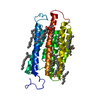
| ||||||||||||||||
|---|---|---|---|---|---|---|---|---|---|---|---|---|---|---|---|---|---|
| 1 | 
| ||||||||||||||||
| 2 |
| ||||||||||||||||
| 3 | 
| ||||||||||||||||
| Symmetry | Point symmetry: (Schoenflies symbol: C3 (3 fold cyclic)) | ||||||||||||||||
| Noncrystallographic symmetry (NCS) | NCS oper:
|
- Components
Components
| #1: Protein | Mass: 31408.795 Da / Num. of mol.: 1 / Mutation: H225F Source method: isolated from a genetically manipulated source Source: (gene. exp.)  Hyphochytrium catenoides (eukaryote) / Production host: Hyphochytrium catenoides (eukaryote) / Production host:  | ||||||||
|---|---|---|---|---|---|---|---|---|---|
| #2: Chemical | ChemComp-RET / | ||||||||
| #3: Chemical | ChemComp-PSC / ( #4: Chemical | ChemComp-PLM / #5: Water | ChemComp-HOH / | Has ligand of interest | Y | Has protein modification | Y | |
-Experimental details
-Experiment
| Experiment | Method: ELECTRON MICROSCOPY |
|---|---|
| EM experiment | Aggregation state: PARTICLE / 3D reconstruction method: single particle reconstruction |
- Sample preparation
Sample preparation
| Component | Name: HcKCR1 / Type: COMPLEX / Entity ID: #1 / Source: RECOMBINANT |
|---|---|
| Molecular weight | Experimental value: NO |
| Source (natural) | Organism:  Hyphochytrium catenoides (eukaryote) Hyphochytrium catenoides (eukaryote) |
| Source (recombinant) | Organism:  |
| Buffer solution | pH: 7.5 |
| Specimen | Embedding applied: YES / Shadowing applied: NO / Staining applied: NO / Vitrification applied: YES |
| Specimen support | Grid material: GOLD / Grid mesh size: 300 divisions/in. / Grid type: Quantifoil R1.2/1.3 |
| EM embedding | Details: nanodisc composed of MSP1D1E3 and soybean lipids / Material: Lipid |
| Vitrification | Instrument: FEI VITROBOT MARK IV / Cryogen name: ETHANE / Humidity: 100 % / Chamber temperature: 277 K |
- Electron microscopy imaging
Electron microscopy imaging
| Experimental equipment |  Model: Titan Krios / Image courtesy: FEI Company |
|---|---|
| Microscopy | Model: FEI TITAN KRIOS |
| Electron gun | Electron source:  FIELD EMISSION GUN / Accelerating voltage: 300 kV / Illumination mode: FLOOD BEAM FIELD EMISSION GUN / Accelerating voltage: 300 kV / Illumination mode: FLOOD BEAM |
| Electron lens | Mode: BRIGHT FIELD / Nominal defocus max: 1600 nm / Nominal defocus min: 800 nm / Cs: 2.7 mm |
| Image recording | Electron dose: 48 e/Å2 / Film or detector model: GATAN K3 (6k x 4k) |
- Processing
Processing
| Software | Name: REFMAC / Version: 5.8.0403 / Classification: refinement | ||||||||||||||||||||||||||||||||||||||||||||||||||||||||||||||||||||||||||||||||||||||||||||||||||||||||||
|---|---|---|---|---|---|---|---|---|---|---|---|---|---|---|---|---|---|---|---|---|---|---|---|---|---|---|---|---|---|---|---|---|---|---|---|---|---|---|---|---|---|---|---|---|---|---|---|---|---|---|---|---|---|---|---|---|---|---|---|---|---|---|---|---|---|---|---|---|---|---|---|---|---|---|---|---|---|---|---|---|---|---|---|---|---|---|---|---|---|---|---|---|---|---|---|---|---|---|---|---|---|---|---|---|---|---|---|
| CTF correction | Type: PHASE FLIPPING AND AMPLITUDE CORRECTION | ||||||||||||||||||||||||||||||||||||||||||||||||||||||||||||||||||||||||||||||||||||||||||||||||||||||||||
| Symmetry | Point symmetry: C3 (3 fold cyclic) | ||||||||||||||||||||||||||||||||||||||||||||||||||||||||||||||||||||||||||||||||||||||||||||||||||||||||||
| 3D reconstruction | Resolution: 2.66 Å / Resolution method: FSC 0.143 CUT-OFF / Num. of particles: 180294 / Symmetry type: POINT | ||||||||||||||||||||||||||||||||||||||||||||||||||||||||||||||||||||||||||||||||||||||||||||||||||||||||||
| Refinement | Resolution: 2.66→2.66 Å / Cor.coef. Fo:Fc: 0.806 / SU B: 5.969 / SU ML: 0.115 / ESU R: 0.154 Stereochemistry target values: MAXIMUM LIKELIHOOD WITH PHASES Details: HYDROGENS HAVE BEEN ADDED IN THE RIDING POSITIONS
| ||||||||||||||||||||||||||||||||||||||||||||||||||||||||||||||||||||||||||||||||||||||||||||||||||||||||||
| Solvent computation | Solvent model: PARAMETERS FOR MASK CACLULATION | ||||||||||||||||||||||||||||||||||||||||||||||||||||||||||||||||||||||||||||||||||||||||||||||||||||||||||
| Displacement parameters | Biso mean: 60.218 Å2 | ||||||||||||||||||||||||||||||||||||||||||||||||||||||||||||||||||||||||||||||||||||||||||||||||||||||||||
| Refinement step | Cycle: 1 / Total: 2354 | ||||||||||||||||||||||||||||||||||||||||||||||||||||||||||||||||||||||||||||||||||||||||||||||||||||||||||
| Refine LS restraints |
|
 Movie
Movie Controller
Controller




 PDBj
PDBj
